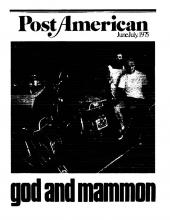The hungry, the ill-clothed, the poorly sheltered, the orphan are at long last becoming more visible to the American public. While urgent needs have existed just beyond our doorsteps for years, it has taken a brutal war, severe famines, and recession to bring human needs to the fore. While the urgency of these are still hammering at our consciences, it is well for Christians to begin re-evaluating our response -- our reasons and patterns for sharing.
The tack often followed in a quest for a Christian economic policy has been to focus on relevant passages in the New Testament -- and rightly so. Yet, one of the passages that is key to our understanding of monetary responsibility has suffered a history of misinterpretation and disregard. That passage is the early chapters of Acts, which reveal the sharing among Christians of the early Jerusalem community. A proper understanding of this initial corporate response to need can provide the 20th-century Christian with principles by which to direct the formation of our responses.
One indication of the misunderstanding surrounding the economics of the Jerusalem Christian community is that it has been called an "experiment," implying that this type of sharing was later discontinued or discredited. A proper response requires investigation first into the social milieu of Jerusalem and second into Paul's collection for Jerusalem.
There were many poor in Jerusalem during the third decade of the first century. Some had been impoverished by the city's frequent inflationary prices, caused by the city's dependence on Palestine for both food and raw materials. Others had migrated to Jerusalem in hopes of securing aid through the alms offered by pilgrims, and even more had found their financial resources diminished by excessive taxation.
Read the Full Article

